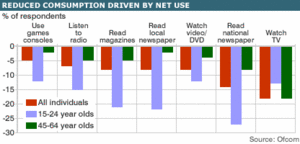16 August 02006
Trends and substitution between media platforms
Tell me if I'm misinterpreting this graph (based on an Ofcom report, via a BBC news story), but I think it's saying that the time young people spend on the net comes particularly at the expense of time they might otherwise have spent on print media (magazines, local and national newspapers).  Conversely the time middle-aged people spend on the net is being subtracted most from the time they used to spend on television.
Conversely the time middle-aged people spend on the net is being subtracted most from the time they used to spend on television.
Put another way, could you say that TV retains some appeal to younger people while the middle-aged are turning it off. And they are still using print to a fair degree, a habit which many 15-24 year olds today have possibly never developed.
When you start thinking about the net 'substituting' for consumption that the new generations have never experienced, you realise that the terminology of substitution actually has limited shelf-life. Does my net use substitute for radio, TV and newspapers. I spend much less time in front of the TV, and I buy newspapers less often — but I was never a big consumer of either. I'm sure I read more from UK newspapers, and from US ones, than I did ten years ago: I just read them online (and I never go through the 'front page'; I always follow deep links into specific newspaper articles). I also watch some TV content online, though probably less than I used to, because I'm only drawn to the content that really needs video representation, and I'm realising how little of that there is.
I also listen to much more radio than I did ten years ago. Here the designation of substitution seems particularly arbitrary: my decision as to whether I listen online or via an 'old fashioned' radio comes down simply to which one is nearer to hand at the time I decide to listen. There are some new classifications of 'radio' like Last.fm and Pandora that are only available online, of course. But even if you take these out of the picture, my radio listening has still gone up significantly.
Interestingly, and notwithstanding the chart above, which appears to show a 6% reduction in consumption of radio, the Ofcom report says radio listening is not in decline overall, but static or very slightly up. I keep harping on about this because so many people, particularly those who know the US figures and the US experience, seem to treat the terminal decline of radio as a fait accompli. To avoid misrepresentation, I quote Ofcom directly:
Listening has risen by 3% over the last five years. National commercial [with ads] and BBC [no ads, except those for other BBC programming] radio picked up listener hours across most age groups; by contrast, local commercial radio suffered losses, particularly among 25-34 year olds (down 30%).
Note: Ofcom is the UK's telecoms and media regulator (similar to the US's FCC). The research in their report was done earlier this year, and combined several wide-ranging methods.
Posted by David Jennings in section(s) Miscellany on 16 August 02006 | TrackBack
Subscribe to my RSS feed, which covers this blog, my book blog, and further commentary on other web resources (more feeds below)
Notes on Emergent Learning
School it Yourself: Review of The Edupunks' Guide and How to Set Up a Free School
What's holding Open Access publishing back?
On ecosystems, Adam Curtis and positions of power
The Whys and Wherefores of Creativity and Sharing: Review of Making is Connecting
Round-up of recent writing in other places
Purpos/ed: What's the purpose of education
Open, trusting, generous: review of Monkeys With Typewriters, a book on leadership
Do we need an agile learning community of practice?
Unplugged! The Agile Learning newspaper
Can we make a newspaper about self-organised learning?
Tony Hall on teaching by not teaching
Ollie Nørsterud Gardener: an entrepreneur's vision of peer-to-peer learning in organisations
Resilience and scaling down in the face of decline (Dougald Hine discussion, part 2)
Cinema (24)
Cultural Calendar (86)
Curatorial (66)
E-learning (102)
Events (35)
Future of Music (95)
Human-Computer Interaction (62)
Ideas and Essays (37)
Long Now (18)
Miscellany (44)
Music and Multimedia (157)
Playlists (27)
Podcasting (12)
Politics (12)
Radio (48)
Reviews (58)
Social Software (60)
Teaching (23)
Alternatively, see the Date-based Archives
Recommended: RSS feed that combines items on this site, my book blog, and commentary on other web resources
RSS feed for this site only
RSS feed for my book, Net, Blogs and Rock'n'Roll
RSS feed for shared bookmarks
My latest bookmarks (click 'read more' for commentary):
My archived bookmarks (02004-02008)
On most social sites I am either 'davidjennings' or 'djalchemi', for example: Flickr, Last.fm, Ma.gnolia and so on…
Lateral Action — managing creativity
Herd — social cognition
Seb Schmoller's e-learning mailings
Viridian Design Movement
Tom Phillips — artist
Long Now blog — resources for long-term thinking
Longplayer live stream — 1,000-year composition

The contents of this site are licensed under a Creative Commons Licence except where otherwise notified.
Hosted by Paul Makepeace
W3C Standards
Check whether this page is valid XHTML 1.0
Check whether the CSS (style sheet) is valid

